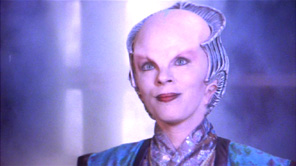Exposition
The Interstellar Alliance was formed in 2261, in the aftermath of the liberation of Earth and the Shadow War. The members included the Minbari, Narn, Centauri, the Earth Alliance and the remaining members of the League of Non-Aligned Worlds, as described in the episode entitled Rising Star . The purpose of the Interstellar Alliance is to create peace and prosperity among its member worlds, provided that its members agree to, and comply with, a code of conduct. The Rangers are the primary peacekeeping force for the Interstellar Alliance.
The Shadow Wars are a fictional series of wars involving the Shadows in the television science fiction series Babylon 5. There have actually been many Shadow Wars since ancient times in the galaxy. Roughly every thousand years, the Shadows begin a new Shadow War to promote chaos in the universe in accordance with their ideology of growth through conflict. During the first two seasons, "The Shadow War" typically refers to the previous Shadow War in the cycle, a thousand years earlier. At this point the one that takes place within the series itself is referred to as "the Coming Shadow War", as it is anticipated but not yet begun. This last war is mainly referred to as "the Shadow War" in the fourth and fifth seasons.
The Minbari are a fictional alien race featured in the television show Babylon 5. The Minbari characters of Delenn and Lennier figure prominently throughout the series; Neroon, Draal, and Dukhat are less prominent Minbari characters.
The Narn are a fictional alien race in the universe of the Babylon 5 television series. Their homeworld is also called Narn.
It is headed by a president, elected by the Interstellar Alliance Advisory Council. The legislature is the Interstellar Alliance Council, wherein each member government had a single vote. This was in stark contrast to the old Babylon council, where each great power (Earth Alliance, Centauri, Narn, Minbari, Vorlon) had a single vote, while the non-aligned worlds collectively had only one vote among them. Also, these votes were not distributed by species, but by government, as some races had separate independent governments, such as Earth and Mars, which were represented separately in the alliance.
After accepting a deal with the Earth Alliance which would protect his crew from disciplinary action but which left him jobless, John Sheridan was nominated to, and accepted, the position of President of the Interstellar Alliance, which he would hold for nearly 19 years. He would be followed in this position by Delenn. The identities of subsequent presidents are not known.

John J. Sheridan is a lead character in the fictional universe of the science-fiction television series Babylon 5, played by Bruce Boxleitner. For most of the series, he is the commander of the Babylon 5 station; during the series' final season he is the President of the Interstellar Alliance.

Satai Delenn is a fictional lead character in the universe of the science fiction television series Babylon 5, played by Mira Furlan.
The Interstellar Alliance would be in existence for at least a millennium after its creation, although various members would temporarily leave the organization due to political, cultural, or cataclysmic events, as described in the episode entitled The Deconstruction of Falling Stars .
"The Deconstruction of Falling Stars" is the final episode of the fourth season of the science fiction television series Babylon 5. This was the final episode of Babylon 5 to air on PTEN, produced as a replacement for "Sleeping in Light" when the show was renewed by TNT.
This page is based on this
Wikipedia article Text is available under the
CC BY-SA 4.0 license; additional terms may apply.
Images, videos and audio are available under their respective licenses.




